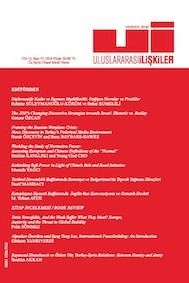
Uluslararası İlişkiler Dergisi
Yazarlar: Barry BUZAN
Konular:-
Anahtar Kelimeler:Securitization,Desecuritization,Military Sector,War of Terror,Globalization of Securitization
Özet: Securitization is the construction of something as an existential threat to a valued referent object, which is used to support exceptional measures taken in response. Desecuritization occurs when something previously accepted as a threat is no longer constructed as one. The article examines the changes in the main patterns of securitization in the military sector across four distinct periods: the classical European great power era ending in 1945, the Cold War, the post-Cold War period, and post-September 11 2001. In the post-September 11 period, it is seen that securitization moved away from classical, state-centric framework of securitization and towards one with much more mixed set of actors and referent objects. Though its is too early to assess the durability of this framework of securitization, it is certain that it differs starkly from the previous periods and involves more structures of violence
Dergi editörleri editör girişini kullanarak sisteme giriş yapabilirler. Editör girişi için tıklayınız.